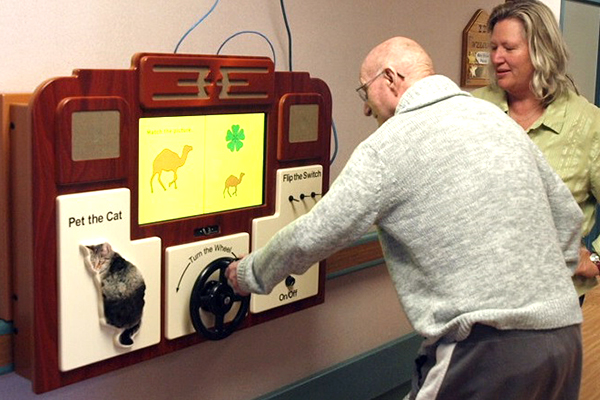November 21, 2017 – Research-industry partnership to premiere first products on December 7 at Baycrest Hospital in Toronto

More than half a million Canadians live with dementia — and that number is expected to almost double in the next 15 years.
Dementia is a degenerative disease described by symptoms including memory loss and difficulties with thinking, problem-solving or language. Some patients also develop mood changes and problem behaviours such as agitation, aggressiveness and delusions. Professor Mark Chignell (IndE) is applying his expertise in industrial engineering to design a solution that provides people in long-term care facilities an opportunity for mental and physical activity that prevents and reduces these behaviours.
“There’s a huge need out there,” says Chignell. “I think that people in long-term care are extremely bored and feel like they have no sense of purpose. I hope this gives them a sense of purpose, because it’s the right thing to do.”
The challenge is personal for Chignell: he has seen firsthand how a cognitive illness and living in long-term care can take away a person’s autonomy. “I had an older sister who was diagnosed with schizophrenia in her late teens. Toward the end of her life, she spent the last few years in long-term care even though she was relatively young. I got to see that even in a caring and well-run home, the residents had few opportunities to initiate activity.”
Chignell partnered with the company Ambient Activity Technologies (AAT) to develop their first product, called Abby. Abby is a large wall-mounted activity station that integrates a screen with wheels, switches and textures. The platform is designed to adapt to a range of puzzles, games and challenges designed to accommodate and stimulate people’s remaining cognitive abilities, prompting them to touch, listen, and respond.
To study its effectiveness, Abby was placed in six Ontario long-term care homes, where results were very positive — after one month of use, it significantly reduced problem behaviours and improved quality of life for residents. “One gentleman used it for hours at a time,” says Chignell.
Watch a video of residents in long-term care engaging with Abby
He notes that one of the problems in long-term care homes is that therapeutic recreationists, who are outnumbered by patients at a ratio of 1 to 20 on average, can only spend a limited time working one-on-one with residents. For those with dementia, the lack of stimulation in their environment then leads to confusion and anxiousness — Abby provides a much-needed outlet that residents can use independently.
“Many of the emotional parts of the brain, and the parts that respond to rewards, are working just fine, so we should focus on what remains,” says Chignell. “Even if they can’t read, or have trouble talking, there are still ways to engage people and to give them meaningful activities that they can perform.”
Chignell and his research team are also developing a second unit, the Centivizer. While Abby is targeted at people with late stage dementia, the Centivizer system is more interactive, featuring reward-focused games and levers. The team designed it as a resource for aging in place and early stage dementia, helping the elderly maintain physical and cognitive functioning. “There’s a whack-a-mole game, which works as a form of cognitive assessment. There’s Simon Says, flashing lights and buttons that play music. There’s a lever for a slot machine game…the idea is to get people moving and thinking, to engage them cognitively through these activities.”
Both units will be showcased on December 7 at the The Centre for Aging & Brain Health innovation at Baycrest Hospital, the official Abby product launch hosted by Chignell and AAT. Chignell and Wilkinson will discuss the research behind Abby and Centivizer with the wider healthcare community with attendees, including frontline healthcare workers, such as therapeutic recreationists, representatives from the long-term care industry, and local health integration networks.
In the near future, Chignell plans to commercialize the Centivizer system. “I want to have people using these. These targeted products with sensory-motor interactions will make a positive difference.”